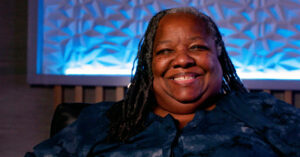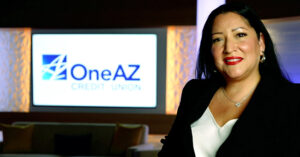We’re back in the studio with the thirteenth episode of the Community Collaborative series where we are joined by inspiring leaders looking to make positive changes throughout the state of Arizona and beyond. As always, this episode follows our conversation with local experts as we discuss how they are making waves in the world of diversity and inclusion. These conversations not only shine a light on what is being done but serve as a reminder that, together, we can bring forth change.
In this episode, the discussion focuses on the power of allyship. Not only do the leaders dive into what it means to be an ally, but they also talk about why it’s so important to diversity and inclusion and how one can go about practicing strong allyship. This episode is all about how empowering allyship can be in moving the needle toward change and what local leaders and businesses are currently doing to help that happen.
While you’ve likely heard the term before, if you’ve found yourself wondering what exactly allyship means or looking for ways to increase your presence and support as an ally, this is a conversation you don’t want to miss.
Community Collaborative co-host/producer and Black Chamber of Arizona CEO Robin Reed is back with co-host/producer and Arizona Hispanic Chamber of Commerce CEO Monica Villalobos to lead today’s conversation with local leaders to provide insight and clarity around the role of allies and offer actionable steps businesses and leaders can take to move in the right direction. They highlight the local efforts and achievements being made to increase inclusivity in our community, especially women in business.
In this episode, Reed and Villalobos sit down with this week’s featured guest Dinora Gonzalez of ASU’s Thunderbird School of Global Management’s Thunderbird for Good program. They also have the pleasure of hearing from an empowering line-up of local leaders.
We added a new segment called Empowerment Gallery, where community leaders give live feedback to the episode’s discussion. Joining the Empowerment Gallery this week is Lloyd Hopkins, founder and Executive Director of Million Dollar Teacher Project, Ashley LaRae, founder of StylePHX, Michael Peel, Statewide Sustainability Director of Local First Arizona, and Frank Martin, realtor and owner at The FMJ Team.
Additionally, the week includes special conversations with our local partners. Led by Jackie Hunter, Sr. Director of diversity and inclusion and talent pipeline at Banner Health, our leaders discuss ways we can all become better allies and how to use employee resource groups to do so with Juan Ruiz, Sr. Director of Employee Experience at Arizona Federal Credit Union.
To kick off the episode, artist Kylelashay Draper returns with a new, but equally breathtaking, performance of her poem, “Originality,” all about the beauty and power of individuality. Listen as she proclaims, “it is our responsibility to change the world with the pressing of our fingertips.” Watch the full performance here:
The conversation begins as Reed and Villalobos discuss the recent presidential inauguration (3:24), commenting on possibilities for a future of change before us. However, Reed suggests we need to “embrace the young brilliant minds that are before us today in order to achieve the potential and future we’re entitled to.” Moving forward, there is “a beacon of hope” for the future, Villalobos adds.
The Power Of Belonging
Hunter joins the conversation to discuss the impact and power of allyship. She explains how allyship is all about those in the majority population bringing “voices and awareness” to underrepresented populations (7:28). It’s about noticing who is not in the room and taking the initiative to speak up for those populations.
By highlighting what allyship looks like and how it is incorporated at Banner Health, Hunter explains how employee resources groups have “played a critical role” in allyship this year, especially for parents suddenly needing to work from home amid the pandemic (9:10). She reflects on her own experience at Banner Health and how it was positively influenced by the support she received as a full-time working mom and how it helped her show up as “her best self” every day, noting they do a wonderful job supporting their employees to meet their individual needs (10:23).
Villalobos jumps in to add her perspective, sharing how allyship in the workplace has allowed her to practice allyship in her personal life as well (12:13). Allyship is the “next level of collaboration,” she says. Allyship is more than impacting the present, Reed adds, explaining how it can also “be used to correct past inequities” (13:47).
Don't Miss These Highlights
Gonzalez comes into the conversation to highlight two special programs at Thunderbird School of Global Management, Project DreamCatcher and Dream Builder, that showcase how influential allyship can be. Both projects are aimed at changing the lives of women in Arizona and beyond by supporting them in their professional goals (25:20). These programs are based around investing in women’s participation in the economy “help[s} to create healthier and more stable communities.”
She explains how DreamBuilder is a “top-notch curriculum” that helps women achieve their dreams of starting or growing their own businesses around the world (25:38). She details how they were able to keep their mission rooted in allyship growing, even in the face of the pandemic.
ProjectDreamCatcher, she explains, is a free business training program offered to Native American women entrepreneurs (27:23). This program is a full week of intensive in-person training on the Thunderbird campus. “The networking is a big part of this program,” she says, explaining how it brings together community members to show what is possible and helps to bring empowerment to these women (28:42). When it comes to allyship and giving voice and possibilities to those who have been historically oppressed, “these are exactly the kinds of programs that we need,” Villalobos adds (30:38).
Hopkins comes into the conversation to share his perspective on the importance of allyship in the workplace (36:29). “Allyship can’t just be a buzzword,” he reminds us. Instead, it’s about “how you engage [and] empower people within your organization.” He discusses the importance of making room for a variety of voices and actually listening to them.
He expresses his desire to “call people in,” describing how doing so grants us opportunities to learn from one another and teach each other. “It’s going to take intentional systemic effort to undo the intentional systemic oppression that was put in place,” he concludes, reminding us that, despite the progress that has been made, issues of inequality are current issues.
LaRae is back to share her thoughts on allyship and power in allyship when it comes to the systemic issues we currently face (41:48). She explains the idea of “coming from within,” describing the need for people in powerful positions who are also in the majority group to be the ones who need to spearhead the change. She echoes the need to “look around the table and see who is missing” and encourages people to think beyond the obvious of race and ethnicity.
Peel comes in to share that allyship even more than supporting underrepresented voices but is also “having a better process and asking better questions” (45:50). He highlights the need to move beyond talking about these issues and actually committing to taking action. When it comes to allyship, he reminds us that it’s about “really thinking about the community at large.”
Lastly, Martin wraps up the episode by relating today’s topics to his home life. “Allyship really starts at home,” he emphasizes, discussing how foundational mindsets are formed at a very young age. He calls for planting the seed for future inclusive leadership by teaching children “all people matter and that everybody’s idea, everybody’s culture matter.” He believes that raising children to understand “a wider view of what life and community actually [are]” will open the doors for a brighter future in the realm of diversity and inclusion.
Actions We Can All Take
Juan Ruiz of Arizona Federal Credit Union is back as our Rally Point Partner to dive into actionable advice about how businesses can advance their employee resources groups with executive-level support (32:53):
- • Include “champions for your cause” at the executive level to help spread the cause throughout the organization.
- • Encourage ERG executives to engage their team members.
- • Give employees room to create their own experience.
- • Foster peer support, even among the “quieter” members.
- • “Don’t just do it to check a box,” fully invest in the program and process.
- • Talk to your team members, especially those that have been historically underrepresented in the workplace.
- • Go to existing ERGs and find out what they need.
- • Foster space where “who [employees] are should not get in the way of their success.”
As we work toward a more diverse and inclusive future, this episode serves as a reminder that it truly takes a village. Whether it is at work, at home, or in the community, allyship plays an imperative role in moving the needle forward for a better tomorrow. These goals will be met through the power of community. We must come together for the change we are after. At the end of the day, “there is nothing more American than allyship,” Villalobos concludes.
With this episode, our inspiring leaders remind us that we all have a part to play. We can all ask questions to help us understand what we don’t know. We can all listen to the voices that have been quieted for much of history. We can all play a part in the change when we come together and take action.
About The Community Collaborative
Community and business leaders and individuals who want to educate themselves on diversity issues will find the series informative and educational. And anyone who wishes to get involved will have ready access to resources featured in each program.
The video series may be streamed for free through the STN app. Viewers may subscribe through STN’s website or by downloading the STN app on the App Store or Google Play.
Each program in the series will provide details on how to get involved in featured activities and initiatives. To be featured in “The Community Collaborative” series or other STN programming, contact us at 480.967.7088.
Every day, there are leaders on the front lines of the fight to improve life in our community. STN provides the platform to tell their and their communities’ stories with video series on leadership philosophies and active efforts to make positive change in our region.





